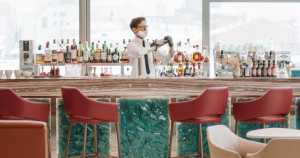
After a decade of talks, Michelin stars arrive in Moscow

French eatery guide Michelin presented Thursday its first ever guide to Moscow restaurants. Negotiations about the long-awaited arrival of Michelin to the Russian capital lasted more than 10 years, disrupted by international political scandals and changes in the city government. In total, the guide could have cost City Hall more than $1 million, Forbes reported.
- The guide features 69 Moscow restaurants. Seven of them achieved one Michelin star, two were awarded a double Michelin star. The Bib Gourmand, a mark of special attention, was awarded to another 15 establishments, and three restaurants received a Michelin Green Star for their environmental approach. Green Stars are awarded to restaurants that “are sensitive to the seasons, promote local produce and reduce food waste,” explained the guide’s international director Gwendal Pullenec. “Russia’s vastness ensures a huge variety of local produce, allowing it to converge with the macro trend for sustainability. There are three restaurants in Moscow with Michelin Green Stars – some countries have none,” he said.
- Michelin, and Moscow Mayor Sergei Sobyanin, announced that the guide would be published in 2021 back in December of last year. Negotiations first began in 2012. Sources in the Russian restaurant industry told Forbes that Michelin’s long journey to Russia could be linked to the limited number of high-quality restaurants, as well as corruption.
- Negotiations intensified in 2013 against a background of increased interest in Russia ahead of the Sochi Winter Olympics, Forbes reported. However, Michelin was unable to publish a guide to Russia before the Games and amid the geopolitical fallout of the annexation of Crimea, the idea was dropped. In late 2018 and early 2019, Moscow’s newly-formed Tourism Committee resumed active talks with Michelin, taking over from the Department of Trade and Services.
- In January 2020, the two sides finally reached an agreement. The contract was worth 80-90 million rubles ($1.13-1.27 million), Forbes learned from a source close to City Hall. For comparison, according to Eater.com, South Korea’s tourist office paid $1.8 million for a Michelin Guide to Seoul in 2016.
- Under the terms of the contract, Michelin inspects Moscow restaurants, stages two formal announcements (one for compiling the guide, and one upon publication) and holds an awards ceremony. The Moscow Tourism Committee told Forbes it was not directly involved in compiling the guide and had no influence over the finished product. Under the contract, Moscow will also pay for an annual update of the ratings but, according to Forbes, this will cost “much less” than the initial price of the guide.
- At a press conference before the ceremony, Moscow authorities made it clear that they expect a rise in gastro-tourism will deliver a return on their investment. “Michelin Stars will be a guiding light for many tourists, especially foreign visitors,” said deputy mayor Natalia Sergunina. Rostourism chief Zarina Doguzova later said Michelin’s arrival was a prestigious event that could help Russia realize its ambitious goals for the tourism sector. Prior to COVID-19, foreign tourists spent $11.5 billion a year in Russia. By 2030 the country hopes to boost that to $22.5 billion.
- A Michelin Guide in Russia might also encourage more domestic tourism. “Russians are typically skeptical of local ratings, so Russians will also want to check in at the places mentioned in the guide,” Irina Avrutskaya, founder of consulting company Like4Like Hospitality Strategies told Forbes. She hopes that the event will be the salvation of the Russian hospitality sector as it struggles with the impact of the pandemic.
- Strong demand is likely to push up prices — and not just in Michelin star locations. Today, the cost of a meal in a high-class Russian restaurant can be 2.5 times cheaper than in an equivalent European or American establishment, where dinner with wine can run to $250 per person.
Why the world should care: The arrival of the Michelin Guide to Moscow is a long-awaited boost for gastro-tourism. However, the reaction hoped for by the Russian authorities could yet be undermined by the rest of the country’s policy agenda, including rising anti-Western rhetoric, the BBC noted. At the same time, restaurants mentioned in the guide could fall even further out of the reach of the majority of Russians due to the inevitable increase in prices.





